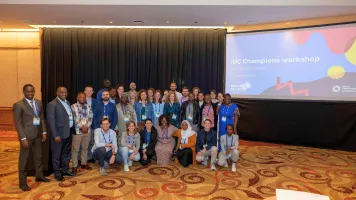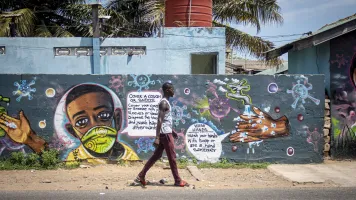COVID-19 is hitting the poorest, most marginalized people the hardest, building on and deepening historical inequalities.
While many governments are working hard to protect people from the catastrophic health and socio-economic effects of the pandemic, the very thing that is guiding their efforts, may inadvertently be reinforcing the inequalities: data.
Marginalized people are often invisible in official statistics and data as they are consistently undercounted in censuses and missed by household surveys. This means that many governments are using incomplete population data to decide how, where, and when to fight the pandemic.
So how do we tackle this?
We must recognize the lack of inclusive and disaggregated data, and take action. We need to build consensus on the importance of collecting and using data that is inclusive of all population groups and can be disaggregated to show sub-groups’ realities.
This is the founding idea of the Inclusive Data Charter (IDC) - an initiative that builds political will for inclusive and disaggregated data. The IDC brings together governments, civil society organizations, and multilaterals to commit to produce and use more inclusive data, set concrete and ambitious goals, and work together to meet these goals.
Addressing data gaps at the same speed as the pandemic will require some out-of-the-box, critical thinking: who is present in the data and who is not? Who collected the data? And for what purpose? Who could potentially be harmed or fear being harmed because of the data?
This is the starting point to identifying and eventually filling data gaps, tackling biases in data collection, ensuring marginalized communities themselves are involved and empowered through data, and ultimately, forging a more inclusive path forward.
As we take action, we can accelerate progress by collaborating and learning from others. Many organizations are already working to ensure their COVID-19-related data is more inclusive.
Here are just a few inspiring examples emerging from the IDC network:
-
Colombia’s National Administrative Department of Statistics (DANE) has developed an interactive tool to identify zones that could be more vulnerable to COVID-19 due to their demographics. DANE is also working to understand how the pandemic is impacting women’s employment in the sectors most affected by the lockdown, through a partnership with Javeriana University to disaggregate data by gender and occupation. They are partnering with UN Women to understand the unequal gender distribution of unpaid domestic and care work, especially how it is affected by social isolation.
-
The Consortium for Street Children are collecting and analyzing data gathered by their network members to document how street children are being affected by COVID-19 and the measures taken to prevent its spread, with a focus on highlighting good practices. They are also advocating for governments and international organizations to prioritize reaching, supporting, and protecting street children from the immediate and longer term health and economic consequences, and promoting sustainable change beyond the current pandemic.
-
The UK Office for National Statistics is responding to an increased demand for inclusive data in light of COVID-19 by adapting existing surveys with enhanced questions on the effects of coronavirus and creating new surveys to assess the impact of the infection on certain groups. They are also utilizing existing data, such as census data, and other new sources of data to look at more disaggregation by disability, ethnicity, gender, geography, and age to understand how different groups are being affected.
-
UNFPA is developing an interactive Population Data for COVID-19 Preparedness dashboard in order to provide UNFPA Country Offices, policymakers, and the general public with access to useful information on the populations at high risk of COVID-19, in order to target preparedness and response, and save lives. UNFPA is also working with countries that have recently completed censuses to tailor and improve national views of COVID-19.
-
The Internal Displacement Monitoring Centre is looking at the impact of the spread of COVID-19 on internally displaced people’s (IDPs) health, livelihoods, housing conditions, and education, as well as how the pandemic could lead to new internal displacement, through a recently launched interactive map and ongoing research efforts.
-
The Institute of Global Homelessness is partnering with homeless organizations throughout the world to put out a global advocacy call to protect, test, and house people who are homeless. They are also supporting Vanguard Cities by sharing resources and strategies for COVID-19 response in homeless services, including the need for self-contained accommodation and a focus on permanent housing solutions.
We call on all organizations - governments, civil society organizations, UN agencies, academic institutions - to follow these examples and work urgently to make data more inclusive. The IDC is an open platform for all to benefit from. Please get in touch if you would like to learn more from others’ work or would like to advance your organization’s commitment to inclusive data.
Although we are all in the same storm, the pandemic has shown clearly that we are not all in the same boat. Global collaboration, knowledge sharing, and support has been critical in the immediate response to the pandemic, and this is equally true in making data more inclusive. We can only beat the pandemic by ensuring that no country, no community, no person is left behind.






